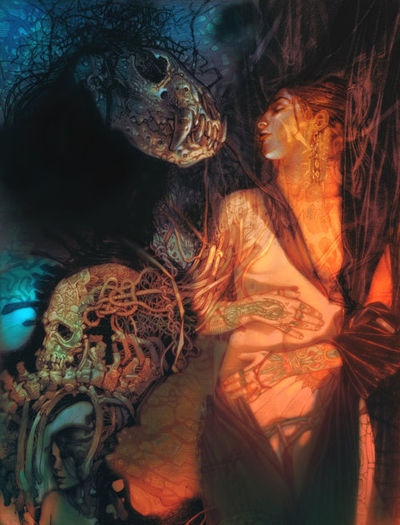Dread Gods

The Dread Gods are eldritch war deities from a lost antediluvian age that continue to speak to monstrous priests in the current era. Driven from the Celestial Realms after the Sundering War and weakened by the worship of younger gods, they constantly call for sacrifices to keep up their strength and power. In return for the relentless blood tithe, their followers are granted hideous boons. Although they have no missionaries in any conventional sense, they occasionally compel individuals to further their dark agenda. Those who have been touched by their influence, whether by miasmic visions of death or by the violent handiwork of the faithful, are often driven insane. Their priests call upon the ancient traditions of the The Great Hunt, a militant hunting organization.
In a psychological sense, the Dread Gods represent the primal urges and instincts that cause an individual to kill. Each of them holds domain over certain aspects of The Great Hunt, and they are glorified by the various Sacred Orders of the Sun. The words spoken through their Prophets are recorded in the Dread Verse.
The Dogma of Blood and a Creation Myth
"Before Tiamat was split to form the earth, before the sun scorched the wastes, before the genesis of the lesser races, there was a time of monsters and Gods. The Dread Gods are the few who survived the war in the stars, just as the monsters living today owe their ancestry to the violent genocides of our early history." - Yaga Xoshawv
The Tradition of Miasma teaches that before the current era of the mortal races, reality was a primeval place of death, violence, and revelry. The Old Ones, the first of the divine beings, had a loose and shifting pantheon of chaotic entities and the Celestial Realm was in pandemonium. At this time, the mortal races (elves, men, dwarves, etc.) were subservient to the monstrous races (trolls, orcs, goblins, etc.) and were used for fodder and sport. The monstrous races at this time were as immortal as their gods, building and destroying empires on the backs of countless mortals in their millennia of existence. Constant contests of strength, cunning, and cruelty drove what little organized society that existed. The powerful ruled over their inferiors with bondage and savagery. This is the True Way, according to the cultists.
The greatest of the Old Ones were the deities Tiamat, Kingu, and Leviathan. Tiamat was the weaver of reality, continually shifting perception and disrupting the physical laws. Kingu, the divine commander, created the first of the mortal and monstrous races and impulsively brought forth all sorts of strange life into existence. Leviathan was the most terrible, swallowing whole planes of existence for spite and consuming the souls who dwelt there as an afterthought. Life was nasty, brutish, and short for the mortal races, but an absolute paradise for their monstrous overlords.
Then, without warning, the Old Ones were no more. A force of great searing light shown through the immaterial planes, driving the absolute divine darkness into diminished shadows. The Celestial Realm was suddenly void of chaos and existence was thenceforth chained to order and regulation. Tiamat was split asunder: her torn flesh became the soil and her bones the mountains; her demonic blood soaked the river beds and her vicious mind became the clouds. Kingu was wrought, and the vita that spilled from him became all known forms of life. Leviathan was the last slain, and the total of her energy became the psychic force of life. In this way, they live on in the combined creation made from their corpses. With their gods decimated, the monstrous races became lesser versions of themselves, as prone to death as their newly ascended rivals in the mortal races.
The only Old Ones to survive the Sundering were the Dread Gods: masters of carnage and killing whose truly sadistic natures had preserved them. They fled from the Celestial Realms severely weakened, taking refuge in the torpor of the Miasma. To keep hidden, they have a multitude of forms and avatars, the most common being their wild and warrior shapes. While their worship has been driven to the fringe of religious activity, their insidious power still permeates the domains of reality they rule, and is harnessed by those who survive the brutal initiations of their cults.
The cultists of The Great Hunt are numerous and have infiltrated every strata of society. In an ironic turn of events, even some members of the so-called mortal races have promised blood and souls to the last of the Old Ones. No one is truly safe from the wrath of the Dread Gods.
Hadal
Portfolio: Red Weapons, Single Blue
Merits: Breaker, Brute, Butcher
Orders: Elm, Willow, Hazel, Rowen, Ivy
Trials: Fire, Metal, Water
Description:
Hadal rules over the dark side of the mind, a being of hate, fear, and anger. This being is the vengeful spirit of cruelty, the irrational rage of a blood-feud, and the cold stab of terror in the night. Possessed by a flame that sears the soul, Hadal seeks nothing less than the destruction of civilization and the obliteration of tame society. Hadal observes the release of life with ecstasy and beholds the sight of gore as a stimulant. Hadal kills for sheer pleasure.
The Hall of Spite is carried in the rush of excitement found in psychotic frenzy. The cultists of Hadal are prone to imbibing various intoxicating herbs heavily before and after a day of fighting, using the torpor granted to fuel their murderous calm. They are granted a singular focus in combat and an unfeeling disposition, often sustaining massive wounds without noticing in order to slay any who oppose them.
Silence
Portfolio: Archery, Dagger
Merits: Sniper, Sneak, Butcher
Orders: Ash, Oak, Rowen, Vine, Aspen
Trials: Air, Earth, Branch
Description:
Silence rules the subtlety of the shadows and the shine of a keen blade pressing against unsuspecting flesh. This being is the grin that haunts the night, snuffing the mortal coil of the unwary or unlucky. Enveloped by a cloak of gloom, Silence is the mechanical mind of the calculating serial killer, clouded by senselessness and tranquil in madness. Silence is not satisfied until the last of its victims draws no breath. Silence kills because it can.
The Scourge Temple exists in the stillness of the corpses of the dead, the eerie chill of quiet after the passing of a life. Cultists of Silence take the profession of the assassin as an act of worship, delighted by the excuse to indulge in their foul addiction. They use the blood of their defeated foes to make obscure prophecies and make it into a tincture to fend off exhaustion, staying up for days to hunt tirelessly in their patron’s name.
Taiga
Portfolio: Spear, Javelin
Merits: Brute, Butcher, Sniper
Orders: Oak, Ash, Reed, Rowen, Elder
Trials: Water, Branch, Fire
Description:
Taiga rules the baser instincts and the cunning genius, the hunger behind the teeth and the brilliance of extermination. Compelled by a thirst for souls, Taiga is the determination of the hardened hunter, void of doubt. Its meticulous path is one of perfection in adaptability, focused and vicious in its rabid pursuit of any weakness. It kills to serve its own desires.
The Shrine of Purpose dwells in the tension before a strike and the preparation for conflict. The cultists of Taiga train rigorously amongst their own, using whatever means available to strengthen themselves and chase excellence. They are granted the advantage of ability and a nearly psychic foresight, feeling very much at home in the haze of battle where they dwell perpetually.
Xeric
Portfolio: Dual, S+B
Merits: Brute, Fiend, Berserk
Orders: Holly, Birch, Aspen, Reed, Elder
Trials: Metal, Air, Fire
Description:
Xeric rules the splendor of supremacy and the will to domination. This being is the prideful boasting of the champion and the provocation in a leering taunt. In Xeric is the force of bravado carried by talent. The allure of Xeric is the strongest, pulling those who lust after perfection onto this perverse path. Xeric kills to prove its absolute authority and exhibit its formidable skill.
The Crimson Altar is shouted in the ballads of the victors and in the grand plans of conquest by mighty generals. The cultists of Xeric array themselves for every available battle, for songs are not sung of warriors who missed their chances at fame. They are especially blessed on the field with an abundance of glory, either in triumph or in death. All monstrous and mortal races crave the favor of Xeric, for with it comes Xeric’s constant power, though few are considered worthy of this god’s attentions.
Tal Kheer
Portfolio: Rocks, Unarmed
Merits: Sniper, Berserk, Sneak
Orders: Hawthorne, Ash, Hazel, Vine, Ivy, Elder
Trials: Earth, Branch, Water
Description:
Tal Kheer rules the murky realm of jealousy, greed, and craven compulsion. From this being is born the impulse to tear down those who seek to rise above and take from them what is rightfully ours. Driven by a blind and carnal rage, the ferocity of Tal Kheer is awesome in its sheer primeval force. Considered the most primitive of the Dread Gods, the doctrine of Tal Kheer is simple but direct. Tal Kheer kills to obtain what belongs to it, and everything belongs to it.
The Wretched Monument lurks in the shock of treachery and the sharp sting of envy. The cultists of Tal Kheer tend to be as primitive as their god, making their settlements far from civilized activity. Most are unabashed raiders driven by fever dreams of avarice, taking what they desire from the corpse of its previous owner. Those who live in more populated areas are often brutal muggers and indiscriminate burglars.
Becoming a God
Once a cultist achieves the rank of Primal, they are permitted to choose which of the Dread Gods they follow. This determines the challenges they will face on their path to divinity. A cultist may change their God only if they fail along the Path and must start over. They then become an Aspirant upon their Path
……………………………………………
Servant: As a servant, the task set before the Aspirant is to attain the rank of Sage in the Sacred Orders that their chosen deity rules over. They also must attain Class V in associated Merits. The Aspirant never loses the glory they gain at this stage. Once they complete this stage, they advance to Soldier.
Hadal - Breaker, Brute, Butcher, Elm, Willow, Hazel, Rowen, Ivy
Silence - Sniper, Sneak, Butcher, Ash, Oak, Rowen, Vine, Aspen
Taiga - Brute, Butcher, Sniper, Oak, Ash, Reed, Rowen, Elder
Xeric - Brute, Fiend, Berserk, Holly, Birch, Aspen, Reed, Elder
Tal Kheer - Sniper, Berserk, Sneak, Hawthorne, Ash, Hazel, Vine, Ivy, Elder
……………………………………………
Soldier: As a soldier, the Aspirant must complete three Epic Merits and two Ordeals. These are specific to the Merits and Trials ruled over by their chosen god. If the Aspirant should fail in their attempt, they lose all progress beyond Servant. Once the Aspirant completes this stage, they advance to Favored.
Epic Merits are done at a National Event and require a dedicated Clergy member to observe. It is declared beforehand that the Aspirant is attempting their Epic Merit. For a period of two hours (not including water breaks and time between matches) the Aspirant must maintain an average of the Class II of that Merit.
▪ SPECIAL*: For the Berserk Epic Merit, the Aspirant must intentionally wound themselves at the beginning of every battle.
▪ SPECIAL*: For the Fiend Epic Merit, the presiding Clergy holds an open barrel where the Aspirant must meet all comers 2v1 for two hours. The Aspirant must win a majority (51%) of the matches in this hour. They are permitted water breaks, but the clock stops during that time
Ordeals are much harder versions of the Trials associated with a given god. They are identical to the Trial in the powers granted to the Aspirant and the handicaps to the Savants; however the number of Savants is doubled. An Ordeal can be undertaken at a National Event or as its own event, whatever is easier for those participating. All Savants must be at least full Hunters. The Council of Primals votes to decide the first of the Ordeals will be undertaken by the Aspirant; the Aspirant choose the second.
……………………………………………
Favored: As Favored of their chosen god, the Aspirant is required to construct a kit emulating their deity (complete with weapons, garb, and full armor) and to undergo a Rite specific to their god. If the Aspirant fails the Rite, they lose all progress beyond Servant. Once they complete their kit and the Rite, the Aspirant advances to become an Avatar.
As an incentive for proper contest, if the Aspirant fails their Rite, any Savants that defeated the Aspirant gain one Boon of their choice for the following: - Ability to choose all Savants for a Trial - The rank of Monk for any Order - One rank of any Merit, unless that rank would fully complete the Merit
Rite of Avarice (Tal Kheer): The Aspirant assembles the required participants at an event, their own residence, or takes them on a camping trip. Each participant prepares three challenges that they screen with the presiding Clergy and Council of Primals beforehand. Starting when the Aspirant choses, the Clergy takes all challenges from the participants and issues them once an hour to the Aspirant over a 24 hour period. Day time challenges should be fighting related, preferably various Trials or Duels, but can also include feats of physical prowess. Night challenges should be creative and can include things like card/board games, drinking games (within reason), etc. The Aspirant must succeed at 18 of the 24 challenges and stay awake for the full 24 hours.
Rite of Domination (Xeric): The Aspirant assembles the required participants at an event, their personal residence, or takes them on a camping trip. The Aspirant then engages in a ladder barrel with the participants, starting with the least advanced, going in order of rank, and ending with the most advanced. There must be at least ten full Hunters among the participants. The Aspirant matches styles with their opponent. The Aspirant may take as much time as they wish between matches, within reason. They get five attempts to kill every opponent, and they must kill all opponents without dying in order to pass this Rite. It must be done over the course of an event or weekend.
Rite of Shadows (Silence): The Aspirant declares that they are taking this Rite before an event and assembles their List in secret, sharing it only with their presiding Clergy. This list must include the names of at least ten full Hunters. By the end of the event, the Aspirant must have assassinated every Hunt member on their list. To do so, they may use stealth, poison (in the form of a sticker on a food/drink vessel), or direct combat. They are allowed to have body guards, but must do the killing themselves. If they die during an attempted assassination, they fail the Rite. Hunt members are not allowed to go out of their way to kill the Aspirant without cause. Their marks must report to the presiding Clergy the manner in which they were dispatched. This Rite does not need to be declare to anyone except the presiding Clergy.
Rite of Ruin (Hadal): The Aspirant must travel to five separate realms and challenge the highest ranked member of the Hunt to a Duel Detande of their opponent’s choice; the local Clergy presides. If the Hunt has no presence in that realm, the Aspirant instead challenges a skilled fighter who has won at least one national tournament, and also must bring along a Clergy member to preside. The Aspirant must win all attempts to pass this Rite.
Rite of Pursuit (Taiga): The Aspirant must arrange for at least ten full Hunters to meet up for a private event or in an isolated area of a national event. A large forested area with obscuration, fixed boundaries, and hiding places is ideal The participants will form teams based on their animal Idol. These teams have individual abilities and weapons. To pass this Rite, the Aspirant must kill at opponents within ten minutes without dying. The Aspirant is allowed five deaths, but a death results in all opponents returning to the field. The Aspirant must take the field with their spear or javelin, and one other weapon of their choice. They may take a shield in addition, if they desire. The Aspirant may wear the armor they designed when they became Favored.
Amphibians: whole team uses single blues, does not die from limb loss
Mammals: half of the team wields a single blue, half the team carries single shield
Reptiles: whole team uses single blue, may wear full personal armor
Birds: half of the team wields archery (max 5 arrows), half the team wields daggers
Fish: style of choice, but dies from any legal hit including a broken shield ……………………………………………
Avatar: After passing their Rite, the Aspirant retains the position of Avatar as long as they go undefeated. There can only be one Avatar of each god. If two Aspirants have passed their Rite, they must fight a General Duel Detande (best of 5 fights) in using one of their god’s chosen styles. This is done in the full armor that the Aspirant already constructed to be Favored. The Aspirant who reached Avatar first picks which of the two styles they will Duel in. The loser of this Duel loses all advancement beyond Servant.
If an Aspirant maintains the position of Avatar for five years or beats five challengers, they become their own god. This means that they get to incorporate a god of their choice or creation into the Lore of the Hunt. They may choose what Trials, Degrees, and Merits their god presides over from the existing ones. They will invent their own Rite for that god. They may no longer be challenged for their position, for they have become a god themselves.
Alternatively, an Aspirant may become a god if they serve as the Avatar of all existing gods.
……………………………………………
Deity: Once an Aspirant has passed the stage of Avatar, they become a Deity. They will write flavor text for the wiki page, matching the pattern for existing gods. They may either choose their own name to add to the pantheon or one from a god of their choosing. When selecting their portfolio, they may choose seven of the following:
- Three Trials
- Three Merits
- Five Orders





